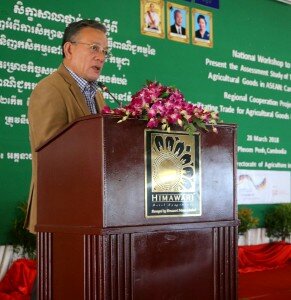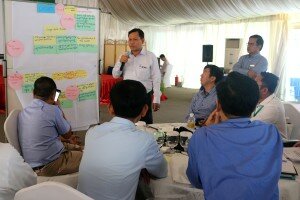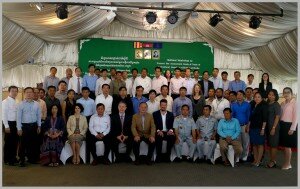
Opening Remarks by H.E Dr. Hean Vanhan, Government Delegate in charge of Director General of GDA.
20 April 2018
The ASEAN Economic Community has determined that trade within the region is to be increased and has also defined Agriculture as a core sector. Within ASEAN approximately 30 per cent of trade take place between the Member States. Although in general the level of intra-ASEAN trade is low, trade in agricultural goods (fruits and vegetables) between Cambodia, Thailand and Vietnam is significantly higher. For fresh agricultural goods, one explanation of this constraint includes gaps in the regulations on food safety and phytosanitary measures (and the associated processes) among ASEAN countries, which can hinder and slow down the movement of goods across borders.
Facilitating Trade for Agricultural Goods in ASEAN or FTAG was initiated to encourage free movement of goods to increase intra-ASEAN trade, implementing in collaboration with Cambodia, Thailand and Vietnam to support facilitation of trade in agricultural goods in ASEAN by emphasizing food safety and phytosanitary measures.
Cambodia can utilize unexploited potential for increasing the economic output and, Cambodian companies engaged in trading between Thailand and Vietnam, can benefit from the trade facilitation and harmonized regulations. A reduction in the cost of border transit due to simplification of regulations and processes benefits not only the traders but also potentially consumers through lower consumer prices, which benefit population groups threatened by poverty. Cambodian consumers also profit from more consistent food quality and potentially lower consumer costs.
The FTAG project has initiated the study on “Assessment of Framework Conditions for Trade in Fresh Fruits in Cambodia” (with specific emphasis on trade in mango, banana, longan, lychee, chili, and dragon fruit in the trade with Thailand and Vietnam) with the objective of providing overview of the situation and identifying potential obstacles to facilitate trade.
Therefore, on March 28, 2018, a National Workshop to present findings of the “Assessment study on trade of agricultural goods in ASEAN: Cambodia” was organized by the FTAG project through GIZ, in cooperation with the General Directorate of Agriculture (GDA).

Presentation the prioritized issues and recommendation of group works.
65 participants from various stakeholder participated in this Workshop as a platform for the key stakeholders to jointly and actively express and exchange information on the barriers/issues for trading fresh fruits, i.e. mango, banana, longan, lychee, chili, and dragon fruit. These include exporters and importers of agricultural goods (fruits), Private Sector Associations, Trade representatives, relevant Ministries i.e. GDA, General Department of Customs and Excise and related border agencies, Ministry of Commerce, Cambodia Import Export Inspection and Fraud Repression Directorate-General, and related border agencies, Embassy of Vietnam and Thailand, and development partners (USAID-Harvest 2, ADB. VSO, EU, SNV) as well as GIZ.
The Workshop agreed on the following:
- Findings of the assessment study on “Conditions for Trade in Fresh Fruits of Cambodia with Thailand and Vietnam”;
- Priority issues (gaps/barriers) for Cambodia in trading fresh fruits with Thailand and Vietnam, and
- Recommendations to make trade of fresh fruits better with trust in predicable and consistent quality and safety of the goods.

Contact:
Ra Ten (Mr.)
Technical Advisor-Trade Facilitation
Facilitating Trade for Agricultural Goods in ASEAN (FTAG)
Cambodia
aimer
Data Protection
Disclaimer
